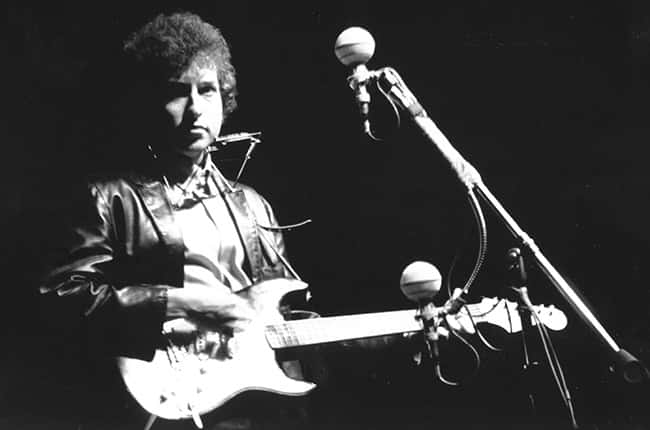Why was Bob Dylan booed at Newport Folk Festival in 1965? No, it wasn't just because he picked up an electric guitar

Bob Dylan is considered as the voice of his generation by many, but this troubadour has also had his fair share of critics in the past. These might have been people who were merely put off by his vocals or his relatively simplistic song arrangements, but what couldn't be denied was that the man was a lyricist par extraordinaire. Dylan has blessed us with scores of timeless tracks, from 'The Times They Are A-Changin' to 'Murder Most Foul'. By the summer of 1965, Dylan had released five albums, and had become the premier figurehead of protest folk songs like 'Blowin In The Wind'. But although he was already considered an American national hero, Dylan as an artist was still transforming, shedding his skin, reinventing himself and his sound as he dove deeper into his craft. His last album, 'Bringing It All Back Home', had released in 1965, featuring an updated electric guitar sound and edgier image for Bob Dylan, who was now getting more comfortable in his own skin, even going as far as to verbally spar with journalists.

The foundations of classic rock music were still being laid in the 1960s, and the horizons for the electric guitar seemed limitless. So when Bob Dylan plugged in an electric guitar at the traditionally acoustic Newport Folk Festival on July 25, 1965 (exactly 55 years ago), the shocked crowd apparently viewed this as sacrilege of the highest order and reportedly booed him for abandoning his authenticity in favor of the emerging trend at the time. They viewed it as Dylan selling his soul for commercial rock 'n' roll and some people allegedly shouted "Play folk music!" and "Get rid of the band!" Bob Dylan would be booed by music purists at live concerts for many months after that, but the Newport Festival incident made headlines, and "Bob Dylan Goes Electric" went down as a seminal moment in music history. However, most people don't realize that there were more factors at play in this age-old story.
For starters, the crowd at the Newport Festival were reportedly unruly, and had been acting rowdy all day, going by accounts of people who were present. Bands like the Chambers Brothers and the Butterfield Blues Band had already played earlier that day with electric instruments, and some of the members of these bands were also part of Dylan's backing ensemble that evening. When Dylan was introduced, the announcer Peter Yarrow informed the crowd that Dylan only had a limited amount of time to play that night, so he would be playing a shortened set. This was what primarily set off sections of the incensed crowd, but their frustration was also matched by loud cheers from people who were excited to see Dylan perform.
In the end, Dylan was only given enough time to play three songs, which seemed to further upset the bewildered crowd, since other performers had been allocated time for longer sets. When he left the stage, the same announcer, Peter Yarrow, asked the agitated audience if they would like to hear more Dylan, and you can clearly hear people yelling "more" in bootleg recordings of the gig. One of Dylan's backing band members, the keyboardist Al Kooper, also revealed the mix of the sound system had been bad that evening, so the poor sound quality also proved to be a crucial factor in the crowd's unrest. So it turns out that a lot of the boos could be attributed to the festival itself, rather than Dylan.
The reason that this popular myth has gained legs over the year is because some of Dylan's fellow folk artists, such as Alan Lomax and Pete Seeger, had reportedly wanted to pull the plug on the performance, with some people even saying Seeger wanted to use an ax to cut the cables and wires that the band was using for their sound equipment. However, other folks counter that Seeger only said this as a verbal threat, with his friend later explaining that the loud and muddy noise was probably proving to be more irritating than enjoyable. Apparently Seeger said something along the lines of, "Get that distortion out of his voice, it's terrible. If I had an ax, I'd chop the microphone cable right now." So once again, it turns out that most people were blaming the sound quality all along, rather than the fact that Dylan was abandoning his acoustic roots.
Dylan would later return to play two songs by himself on the acoustic guitar, 'Mr Tambourine Man' and 'It’s All Over Now Baby Blue', which was well-received by all accounts, with the crowd even giving him a standing ovation. Soon after the festival, some newspapers starting reporting that Dylan had been "roundly booed by folk-song purists who considered this innovation the worst sort of heresy." But it turns out that some of this information had merely been largely based on subjective accounts of the incident.
Thankfully Bob Dylan shrugged off the bad press like only an artist of his stature is capable of, and the young music sensation went on to dominate popular culture for the next half-century. He received the Nobel Prize for Literature in 2016, and the 79-year-old legend is still going strong, releasing his critically acclaimed album 'Rough and Rowdy Ways' in June this year. If there's one thing Dylan has taught us, there's more than one way to skillfully tell a story, but this incident on July 25, 1965, will always be remembered as one of the most talked-about moments in music folklore.










